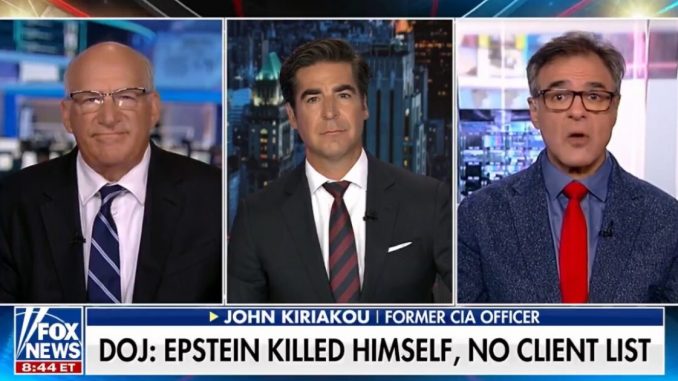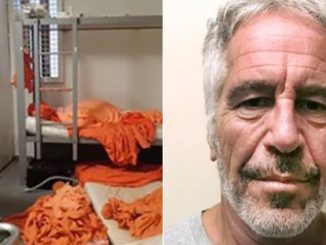
| Published July 8, 2025
In a recent appearance on Jesse Watters Primetime on Fox News, former CIA officer John Kiriakou made a bold and provocative claim: he believes that the “Deep State” most likely destroyed the Jeffrey Epstein files long before the public ever had a chance to see them. Kiriakou, known for his whistleblowing on CIA torture programs and his outspoken criticism of the intelligence community, suggested that entrenched government operatives within agencies like the CIA and FBI may have taken preemptive steps to erase evidence that could implicate high-profile individuals in Epstein’s sex trafficking operation.
This statement came in response to the FBI’s newly released memo, which stunned many observers by claiming that no client list exists, that there was no blackmail material found, and that Epstein’s death was officially ruled a suicide. The memo supported the conclusions of the FBI, DOJ Inspector General, and other investigators, who all agreed there was no evidence contradicting the official story.
Kiriakou, however, cast doubt on the timing and thoroughness of these investigations. He implied that long before FBI Director Kash Patel or Deputy Director Dan Bongino took leadership (both Trump allies), critical evidence may have already been removed or destroyed by lower-level career officials within the intelligence community. This layer, often referred to as the “Deep State” in conservative media, is accused of obstructing justice to protect elite figures from being exposed.
The Gateway Pundit’s report aligns with a broader wave of skepticism coming from conservative circles who have long suspected that powerful individuals involved in Epstein’s network may have been shielded by government agencies. The report also noted the missing one minute of surveillance footage from Epstein’s jail cell the night he died, a detail that continues to fuel public suspicion despite multiple investigations.
Kiriakou’s interview and the FBI memo have reignited debate among commentators, journalists, and the public about the truth behind Epstein’s connections, his death, and whether the full scope of his network will ever be brought to light.
🧠 Broader Context and Analysis
The controversy surrounding Jeffrey Epstein’s death, alleged connections to global elites, and now the alleged destruction of related files by the “Deep State,” is more than a single story — it is a window into the larger public crisis of trust in American institutions, especially federal law enforcement and intelligence agencies.
🔍 What Is the “Deep State”?
The term “Deep State” is often used in political commentary to describe a network of unelected bureaucrats, intelligence officials, and government insiders who allegedly wield influence independently of, or in opposition to, elected officials. While some see it as a metaphor for entrenched bureaucracy, others — especially on the populist right — believe it to be a real and deliberate force working behind the scenes to protect powerful figures, suppress dissent, or manipulate outcomes.
Former CIA officer John Kiriakou’s claim that the Deep State likely destroyed the Epstein files taps into this perception, suggesting a coordinated internal cover-up by career officials within the CIA or FBI — people who operated before MAGA-aligned leadership took over parts of the executive branch in the Trump era.
🧾 FBI Memo vs Public Suspicion
The July 2025 FBI memo concluded the following:
-
No client list exists tied to Epstein’s alleged sex-trafficking network.
-
No evidence of blackmail material was found among Epstein’s possessions.
-
Epstein died by suicide, a conclusion echoed by earlier investigations by the DOJ Inspector General and New York’s medical examiner.
-
There was a “missing minute” of surveillance footage, but no indication of external tampering.
Despite the memo’s straightforward conclusions, public skepticism remains high. Many critics argue that these findings appear too convenient — especially in light of Epstein’s known connections to high-ranking politicians, businessmen, celebrities, and even royalty.
For many observers, the idea that no records survived and no leads remain is difficult to believe. The lack of transparency, combined with earlier lapses in jail security, and Maxwell’s sealed trial documents, have only intensified speculation that something is being hidden.
⚖️ Who Is John Kiriakou, and Why Does He Matter?
Kiriakou is not a fringe voice — he is a former CIA officer who served prison time for leaking classified information about the CIA’s waterboarding program. He has long been a critic of U.S. intelligence operations and has positioned himself as an insider-turned-whistleblower. His credibility depends on your perspective:
-
Supporters see him as a truth-teller with firsthand experience of agency corruption.
-
Skeptics see him as a disgruntled former agent making broad claims without evidence.
Regardless, his remarks — especially on platforms like Fox News — hold weight with viewers who already distrust the federal government and suspect elite protection schemes.
🧨 Political Fallout and Cultural Impact
This renewed focus on the Epstein case reflects deeper cultural tensions:
-
Populist distrust of elites continues to grow, especially among conservative audiences.
-
Epstein’s death is seen by many as symbolic of how justice is applied differently to the powerful.
-
Accusations that intelligence agencies may have deliberately covered up the truth erode faith in institutions at a time when U.S. civic trust is near historic lows.
Meanwhile, the absence of criminal accountability for most people in Epstein’s orbit has fueled an ecosystem of conspiracy theories that are difficult to contain — especially when official reports fail to address the public’s unanswered questions.
 Resulting Effects:
Resulting Effects:
1. Erosion of Public Trust in Federal Institutions
The Epstein case has already been a flashpoint for public distrust, but the renewed claim — that critical files may have been destroyed by internal intelligence actors — amplifies the perception that the justice system protects elites while targeting ordinary citizens.
-
Americans who already felt alienated from institutions like the DOJ, FBI, and CIA may now view them as actively complicit in covering up crimes.
-
This distrust is especially high among conservative and populist voters, many of whom already believe federal agencies are weaponized against political dissent.
2. Increased Polarization and Partisan Narratives
Allegations of a Deep State cover-up feed directly into partisan divides, where:
-
Conservative and MAGA-aligned commentators argue the system is rigged to shield left-leaning or establishment elites.
-
Mainstream and liberal media dismiss such claims as baseless conspiracy theories, leading to parallel media realities with little room for consensus.
This polarization limits the ability of any future investigation — even a legitimate one — to be accepted as credible across the political spectrum.
3. Fuel for Conspiracy Movements
Accusations like those from Kiriakou, aired on mainstream conservative platforms like Fox News, serve to legitimize narratives often confined to online forums or fringe outlets.
-
Movements like QAnon or other anti-establishment groups now have renewed momentum, citing this as further “proof” of elite pedophile networks being protected from exposure.
-
It also encourages citizen-led investigations, online sleuthing, and further distrust of official reports — regardless of evidence.
4. Pressure on Political Leadership
Politicians aligned with transparency and anti-corruption efforts may now face mounting pressure to:
-
Reopen the Epstein investigation or push for the release of sealed files, especially related to Ghislaine Maxwell’s trial.
-
Purge intelligence agencies of entrenched bureaucrats viewed as unaccountable or politically biased — a key goal among some populist and libertarian circles.
-
Demand oversight hearings in Congress to investigate not just the Epstein case, but broader allegations of federal agency overreach.
However, such efforts may be blocked by gridlock or lack of bipartisan support, further fueling frustration.
5. Damage to U.S. Global Image
International observers — especially in countries already critical of U.S. foreign policy — may view these developments as a confirmation of American institutional hypocrisy.
-
The U.S. often positions itself as a global advocate for human rights, anti-corruption, and transparency.
-
Yet, accusations of elite protection, secret cover-ups, and destroyed evidence suggest to outsiders that the U.S. may not practice what it preaches — undermining credibility abroad.
6. Implications for Future Whistleblowers
Kiriakou’s remarks could have a dual effect:
-
Inspire other insiders to speak out about classified misconduct, especially if they feel public support is growing.
-
Intimidate would-be whistleblowers, who may fear retaliation or that their revelations will be ignored, suppressed, or politicized.
This dynamic will shape how internal dissent is handled in intelligence and law enforcement agencies moving forward.
 Bottom Line:
Bottom Line:
Once again, the American people are being asked to take the word of the very institutions that have repeatedly failed them. The FBI’s claim that no Epstein client list exists—and that his death was just a suicide—isn’t just hard to swallow; it’s an insult to the intelligence of every citizen who’s been watching this cover-up unfold for years.
Now we have a former CIA officer confirming what many have suspected all along: that the so-called “Deep State” likely destroyed the evidence long before truth could see the light of day. If true, this is not just a scandal—it’s a national disgrace.
This isn’t about conspiracy theories. It’s about accountability. It’s about a justice system that works for all Americans, not just the rich, the powerful, and the politically connected. Until every file is unsealed, every name is exposed, and every question is answered, the Epstein case will remain a stain on our institutions—and a warning of what happens when truth is buried to protect the elite.
It’s time to clean house. America deserves better.





Be the first to comment